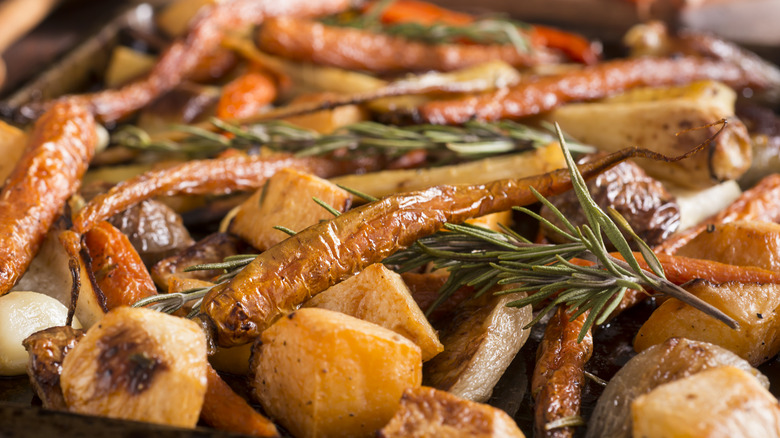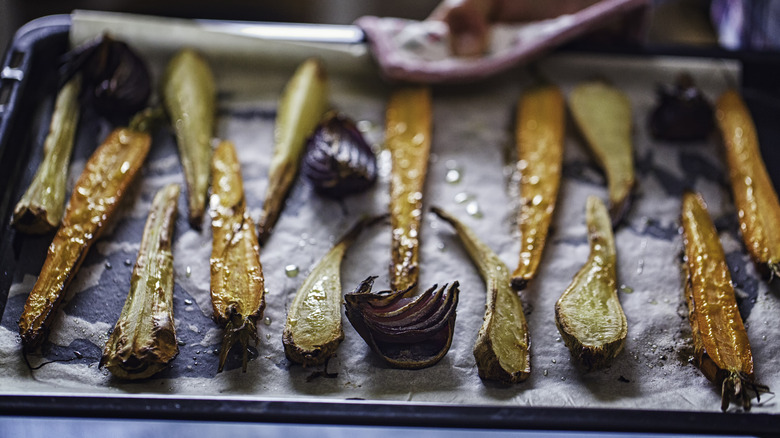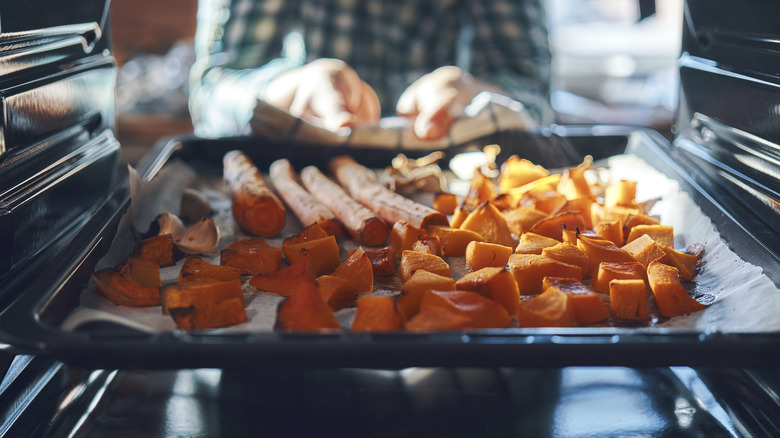You Can And Should Skip The Oil When Roasting Vegetables
Roasting vegetables is probably something you learned how to do once, and never bothered to question again. You just toss your veggies in salt and olive oil and stick them in the oven on a metal sheet pan — right?
While it may seem intuitive, roasting vegetables in olive oil is actually not necessary to get them cooked and crispy. In fact, it has some natural detractions. Largely, the fact that olive oil has a relatively low smoke point, which means that if cooked for too long, or at too high a temperature, it will start to fill your kitchen with clouds of smoke. The average smoke point for extra virgin olive oil maxes out around 410 degrees Fahrenheit, which makes it less ideal for veggies that need more time in the oven, like potatoes or beets. Luckily, you can skip the oil entirely and dry roast your vegetables, which makes your washing up way easier and prevents a smoky kitchen.
Why you should dry roast your veg
Dry roasting vegetables allows their primary flavors to shine through and prevents them from being overpowered by your oil of choice. In addition, the flavors of cooking fats like olive oil can alter or deteriorate at high heat – even before they hit their smoking point. So by waiting to add your olive oil until after your veggies have been roasted, you're preserving its complexity. You could even switch it out for a higher quality finishing oil (maybe even an Ina Garten-worthy olive oil) to really bring your dish that finishing touch.
Dry roasted vegetables lose more water than ones roasted in oil, so they will easily absorb any oil or butter added right after. Just be sure to add any fats or seasonings as soon as your veggies are out of the oven. You could also dry roast your vegetables and add oil or other fats at the very end of the cooking process for a finishing glaze.
Other oil alternatives for roasting veggies
Perhaps you don't want to roast your veg in olive oil, but you still aren't sold on dry roasting. There are plenty of alternatives to olive oil that come with higher smoke points and won't deteriorate to the same extent. Avocado oil, for example, has a smoke point of 520 degrees Fahrenheit, which makes it safe for just about any recipe. It's also a far more neutral oil than olive oil, as good for roasting sweet things as it is for savory. Avocado oil is also a great alternative when baking.
Clarified butter, or ghee, is also a great option, with a smoke point of 450 degrees Fahrenheit, and a mellow, slightly nutty flavor. Plus, it's full of omega-3s, which may reduce inflammation of the gut (per Healthline).
If you don't need to cater to vegetarians, schmaltz, aka chicken fat, is also great for roasting. Schmaltz has a smoke point higher than that of olive oil and is a great no-waste kitchen ingredient for those who enjoy making a pot of chicken stock. Instead of skimming the fat off your stock, let it cool in the fridge after it's finished. The fat will rise to the top and form a thin layer, which can be scooped off and used as a butter alternative on toast, or for roasting just about anything.



